NEWS RELEASE
OFRANEH named 2023 recipient of Human Rights and Business Award
Human Rights and Business Award Foundation
Geneva, 28 November 2023
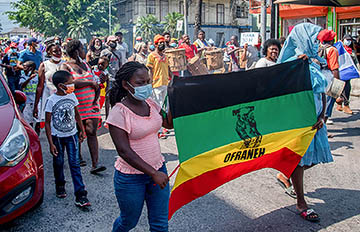
Today, during the annual United Nations Forum on Business and Human Rights, our foundation is naming OFRANEH (Organización Fraternal Negra Hondureña / Black Fraternal Organization of Honduras), as recipient of the 2023 Human Rights and Business Award. The award recognizes “outstanding work by human rights defenders addressing the human rights impacts of business”. A 3-minute video announcing the award, available in English and Spanish, features Miriam Miranda (OFRANEH), as well as Fernanda Hopenhaym.
OFRANEH, founded in 1979, defends the human rights of indigenous Garífuna communities in Honduras, seeks to guarantee their survival as a differentiated culture, and defends their ancestral lands against land grabs by the private sector. OFRANEH is female led, takes a strong antiracist approach, and has a keen awareness of how to defend rights.
The foundation’s board members (Christopher Avery, Regan Ralph and Valeria Scorza) said today: “We are very pleased that the 2023 award goes to OFRANEH, an exceptional organization of courageous human rights defenders who have been working for decades, at great risk to themselves, to defend the rights of the Garífuna people in Honduras.”
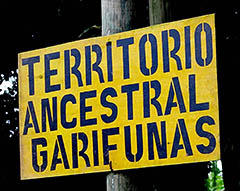
The foundation’s Advisory Network member Fernanda Hopenhaym, Co-Executive Director of PODER (Mexico) and member of the United Nations Working Group on Business and Human Rights, commented: “Over the years I have gotten to know leaders of OFRANEH and they are truly inspiring people, keeping integrity in the face of huge challenges.”
The Garífuna are people of mixed Indigenous Arawak and Black African ancestry; they speak Garífuna and Vincentian Creole. Their lands are linked to their livelihoods, including subsistence farming and small-scale fishing.
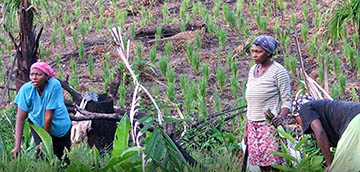
The Garífuna community’s ancestral claim to their lands in Honduras dates back to 1797; it was not until 1887 and 1901 when the State of Honduras began recognition of the ancestral territory through the granting of communal property titles. OFRANEH notes that these titles have been violated by the State itself, granting the lands to third parties and thus violating the ancestral rights of the communities.
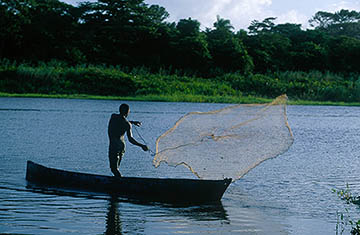
Against a background of violence and a weak state, OFRANEH’s work includes defending the self-determination and traditional ways of life of the Garífuna; protecting their economic, social and cultural rights; and preventing displacement. In the words of Miriam Miranda, the elected General Coordinator of OFRANEH: “The Garífuna are being forcibly displaced from our beautiful traditional lands along the Caribbean coast of Honduras. Our livelihoods are threatened by the expansion of the global tourist industry, African palm plantations, so-called “Special Economic Development and Employment Zones” (also called Model Cities), and drug cartels that run cocaine through our territories…We’re also under threat from gated retirement communities with U.S. and Canadian financing, as well as mining and hydroelectric projects, including projects with development bank financing.”
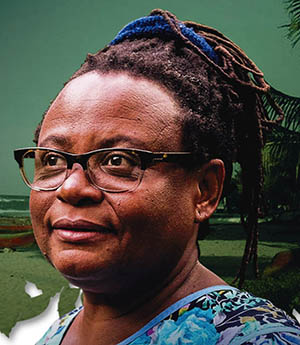
OFRANEH members have been harassed, threatened, beaten, kidnapped and killed, often as a result of defending their land amidst land grabbing and territorial disputes.
“Violence and physical force have been constantly used to threaten the livelihood of the Honduran Garífuna communities,” concluded a 2016 report by the Council on Hemispheric Affairs. In a 2017 report entitled “Honduras: The deadliest place to defend the planet”, Global Witness documented “shocking levels of violence and intimidation” suffered by rural and indigenous communities “for taking a stand against the imposition of dams, mines, logging or agriculture on their land – projects that are controlled by rich and powerful elites, among them members of the political class. The root causes of these abuses are widespread corruption and the failure to properly consult those affected by these projects. Nowhere on earth are you more likely to be killed for protesting the theft of land and destruction of the natural world than in Honduras.” That report said “123 land and environmental activists have been murdered in Honduras since the 2009 coup, with countless others threatened, attacked or imprisoned.”
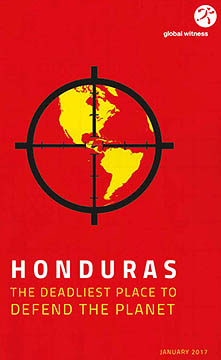
OFRANEH works at all levels – local, national, regional and international – to defend the rights and ancestral lands of the Garífuna people.
In 2003 OFRANEH petitioned the Inter-American Commission on Human Rights (part of the Organization of American States) to present three of the Garífuna’s cases to the Inter-American Court of Human Rights. Their complaints detailed years of human rights abuses by the Honduran state and corporate actors. The Garífuna stated that they had not provided “free, prior, and informed consent” (required by the United Nations Declaration on the Rights of Indigenous Peoples) before development projects took place. In 2015 the Inter-American Court issued two rulings on Garífuna cases. The court:
- found the Honduran state responsible for violating the Garífuna’s collective ownership rights and not affording them due judicial protections;
- affirmed the importance of free, prior, and informed consent; and
- ordered reparations including a public statement of responsibility, collective land ownership titles, and future protections for ancestral lands.
Despite those rulings by the Inter-American Court, OFRANEH reports that since 2014 the pressure on the Garífuna people and their territory has increased dramatically – for example:
- In July 2014, a group of armed men kidnapped and held at gunpoint OFRANEH’s leader, Miriam Miranda, and some of her colleagues; they were freed later that day, and the armed men escaped.
- Between 2016 and 2019, three defenders from the community of Masca, Omoa, were murdered.
-
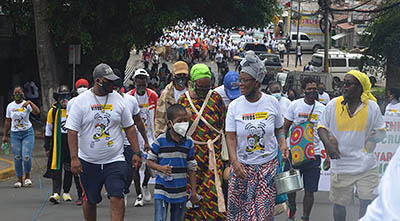
Demonstration calling for compliance with Inter-American Court judgments, and for appearance alive of the “disappeared” of Triunfo de la Cruz In July 2020, Snaider Centeno, president of Triunfo de la Cruz community, and three other local defenders were forcibly disappeared, reportedly taken at gunpoint by more than 30 heavily-armed men dressed in Honduran police uniforms and identifying themselves as part of the Police Investigations Branch (DPI); they have not been seen since. OFRANEH established the Investigation and Search Committee for the Disappeared of Triunfo de la Cruz (SUNLA) to find the whereabouts of those who were taken, to identify the perpetrators, and to demand justice for the victims and their families.
- In March 2021, sisters Marianela and Jennifer Solórzano were detained, accused of supposedly “usurping” lands from the company Bienes y Raíces Juca SRL which planned to build real estate projects on ancestral territories of the Garífuna.
- In 2022, the president of the Nueva Armenia community board of trustees received multiple death threats.
- In late 2022 members of the Land Defense Committee of Triunfo de la Cruz were subjected to persecution and threats, and given 24 hours to leave their community.
-
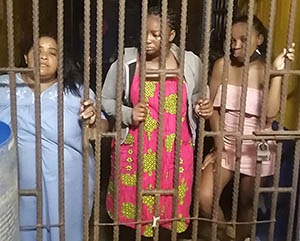
Melissa Martínez, Dorotea Arzú, Keyder Tishany González, beaten and detained in violent eviction of community of Punta Gorda In November 2022, the community of Punta Gorda, Roatán, was violently evicted from their land by the National Police, Armed Forces and Police Investigations Branch (DPI); OFRANEH’s local coordinator Melissa Martínez and five others were detained; 65 other community members were seriously injured. Punta Gorda was the first Garífuna community in Honduras, founded in 1797, before Honduras became a Republic in 1821.
- In 2023 two defenders of Triunfo de la Cruz community have been assassinated.
- Early morning on September 19, 2023, at least four unknown and heavily armed men reportedly entered the community of Vallecito, Colón, and surrounded the house of Miriam Miranda. Members of Miriam’s security team demanded that the strangers identify themselves, but they fled the scene. The strangers were heard to say that next time they would come to “finish the deal”. On 21 September the Office of the United Nations High Commissioner for Human Rights (OHCHR) in Honduras issued a statement expressing its concern about the risk faced by Miriam, and the lack of review of the Honduran government’s protection measures for her, particularly after the past threats she had received. The OHCHR noted that the Honduran government’s Technical Committee of the Protection Mechanism had failed to hold its session scheduled for 20 September to review Miranda’s protection plan because three of the four Honduran governmental authorities/agencies that make up that committee did not attend. The OHCHR called on the Government of Honduras to strengthen its commitment and its measures to protect human rights defenders at risk. In a statement issued on 20 September condemning the attack on Miriam, the Honduras Solidarity Network of North America said: “For many years, the list of attacks on Miriam has grown to be quite extensive, while the list of those punished for such attacks is non-existent.” The statement called for:
- an end to impunity – bringing to justice all perpetrators of attacks on Garifuna human rights defenders;
- Miriam to be provided with additional forms of protection;
- the Honduran state to implement Inter-American Court of Human Rights rulings calling for an end to violations of Garifuna land rights and cultural rights, and restoration of stolen lands.
OFRANEH reports that all the above violations and threats are due to the process of illegal occupation of Garífuna territories by third parties that operate with the support of the Honduran state.
Much Garífuna communal land has been acquired by real estate companies, particularly Canadian firms. In 2007 Randy Jorgensen’s development company Life Vision Properties began acquiring land outside Trujillo to develop a cruise ship terminal and gated retirement home properties for North Americans. From the outset, Garífuna communities, with the support of OFRANEH, protested these acquisitions and developments on the grounds that the Garífuna were given no opportunity to consent to the sale of their communal land, and whoever “sold” the land was not their legitimate representative.
In 2017 Miriam Miranda said: “Human rights defenders are at a greater risk than ever today because our states, our governments are actually responding to the interests of transnational capital in our countries, and the state does not guarantee the protection of defenders.”
In July 2021 the Office of the United Nations High Commissioner for Human Rights (OHCHR) in Honduras and the Inter-American Commission on Human Rights called on the Government of Honduras to stop the criminalization and harassment of Garífuna human rights defenders, particularly those who defend their ancestral lands and natural resources. They also urged the government to step up its actions to respect and guarantee Garífuna community lands, territories, and natural resources. The OHCHR reported attacks on 120 human rights defenders in Honduras from January through August 2022, including 78 environment and land defenders.
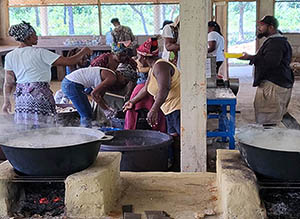
In Vallecito, Colón, OFRANEH has organized the largest food sovereignty program in Honduras. More than 100 hectares of coconut have been planted to provide food for Garífuna communities. The program includes a facility for producing coconut oil and derivatives.
OFRANEH also has promoted nine Ancestral Health Houses to provide comprehensive health for the communities, “based on the ancestral knowledge, practices and knowledge related to the well-being of the body, the mind, the environment and the spiritual base of the members of the Garífuna communities.”
Miriam Miranda commented in 2015: “Without our lands, we cease to be a people. Our lands and identities are critical to our lives, our waters, our forests, our culture, our global commons, our territories. For us, the struggle for our territories and our commons and our natural resources is of primary importance to preserve ourselves as a people.”
OFRANEH has received other awards for its outstanding work; including:
- 2015: OFRANEH’s leader Miriam Miranda was co-recipient of the Óscar Romero Award “in recognition of heroic efforts in the area of human rights”, alongside Honduran indigenous leader Berta Cáceres (assassinated in 2016). The award is named for Archbishop Óscar Romero of San Salvador, assassinated in 1980 after years of speaking out against human rights abuses by El Salvador’s military government.
- 2016: OFRANEH received the Premio Nota SOL, given “to recognize and encourage groups that are carrying out, or have already carried out actions, initiatives, and projects designed to strengthen the culture of indigenous peoples, foster sustainable development, and defend their universal human rights.”
- 2016: The Carlos Escaleras environmental award was given to Miriam Miranda in recognition of her work with OFRANEH. The award is named after the Honduran environmental and human rights defender who was assassinated at age 39.
- 2019: Miriam Miranda received the Friedrich Ebert Foundation award for her longstanding commitment to the rights of indigenous people and women, and to environmental protection.
- 2021: The Institute for Policy Studies’ Letelier-Moffitt Human Rights Award was given to OFRANEH, recognizing “the often unsung heroes throughout the hemisphere who fight for economic, cultural, social, and civil rights”. The award honors Orlando Letelier and Ronni Karpen Moffitt, who were assassinated by the Pinochet regime for their work defending democracy and human rights in Chile.
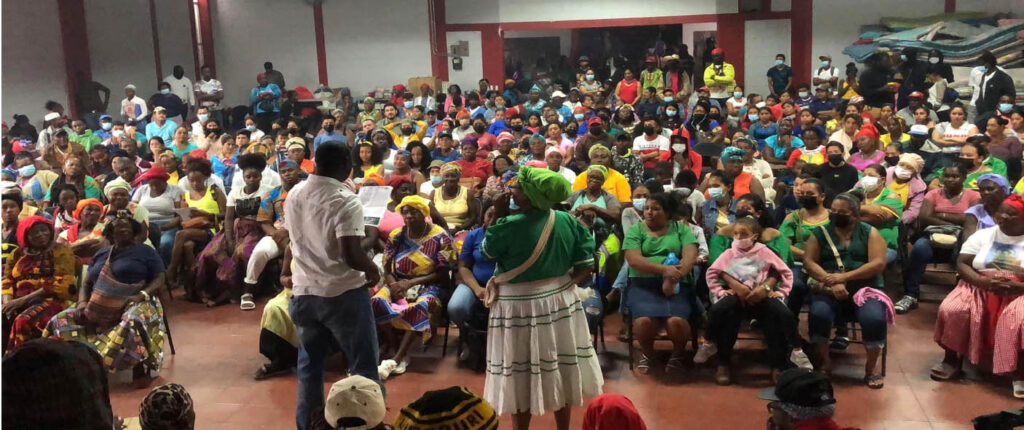
All nominees for the 2023 award
Following is a list of all the organizations nominated for the 2023 Human Rights and Business Award by members of the foundation’s Advisory Network. Each of these is doing important work deserving international recognition.
- Corporacion Colectivo de Abogados José Alvear Restrepo – CAJAR (Colombia)
- Fuerza de Mujeres Wayuu (Colombia)
- Observatorio Ciudadano (Chile)
- Organización Fraternal Negra Hondureña – OFRANEH (Honduras) – AWARD RECIPIENT
- Pytyvohára Sauce Platform – PSP (Paraguay)
- R3D – Red en defensa de los derechos digitales (Mexico)
The award alternates annually by region – this year Latin America & Caribbean countries; next year Middle East & North Africa.
About the foundation
Human Rights and Business Award Foundation is an independent non-profit foundation. To ensure its independence, the foundation does not accept donations from any government or any company. The foundation’s Board members and Advisory Network members from across the world are listed on this webpage. Contact: contact@humanrightsandbusinessaward.org
OFRANEH is the sixth recipient of the annual award. The previous winners:
- 2022: Oil Workers’ Rights Protection Organization – OWRPO (Azerbaijan)
- 2021: AFREWATCH (Democratic Republic of Congo)
- 2020: Migrant Workers Rights Network (MWRN) (Thailand)
- 2019: Al-Haq (Palestine)
- 2018: Justiça nos Trilhos (Brazil)

